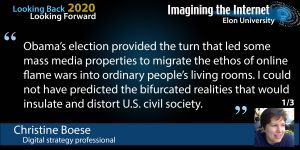A press release about the report, which I am very proud to be included and cited in!
News release: How do past predictions about the future of digital life in 2020 stand up today? Experts reflect and look ahead to the future.
New report offers a look back at predictions made 10-15 years ago, offers experts’ updated opinions, notes that the internet’s impact on humans’ intelligence and emotional condition were vastly underappreciated, offers insights for the decades ahead.
A report released on Dec. 29, 2020, by the Imagining the Internet Center at Elon University examines experts’ past predictions about the evolution of networked technology and suggests what may lie ahead. Researchers examined 12 “Future of the Internet” canvassings of leading technology experts by Imagining the Internet and the Pew Research Center that were released between 2005 and 2011. Four of the studies contained questions in which experts were asked to make predictions about digital life in 2020. Several of experts quoted in those reports were recently asked to reflect on their earlier forecasts.
Co-authors of the report are Lee Rainie, director of Internet and Technology Research at Pew; Elon University Professor Janna Anderson, director of the Imagining the Internet Center; and Emily A. Vogels, a research associate at Pew.
Anderson says several of the experts were interviewed again in 2020, offering intriguing new insights. “They note that we are just discovering the overwhelming impact of digital life on human intelligence and emotion. Over the 16 years we have engaged with these experts, they have offered affirming and positive hopes that new digital tools will make life healthier, safer, easier, more fulfilling and fun. At the same time, there has been a growing drumbeat of worry in recent years that dark forces are gaining the upper hand in ways that raise questions about whether humans will be able to live such free and unfettered lives in the future.”
Rainie says, “For the most part, most of the experts’ predictions for 2020 that were made 10 to 15 years ago have been striking in their accuracy. They are a tribute to the foresight of the experts we consult. Their thoughts prompt serious consideration of the ways technology is changing our lives and societies.”
Key insights of the report include the following:
[. . .]
Fading chances for a rise social tolerance?
In the 2007-08 canvassing, 56% of experts disagreed with the statement that social tolerance would have advanced significantly by 2020 due in great part to the internet. Many at that time hoped the global village being built online would bring people closer together, but about the same number didn’t see it happening.

One of those who predicted tolerance would not grow over time was Christine Boese, a digital strategy professional.
“The real propaganda rallies of our age are not on grand vistas in Nuremberg, full of pomp and showmanship,” Boese says as she explains the ways in which intolerance appears to have been accelerated by humanity moving online. “Rather, they take place in the intimacy of living rooms, in front of televisions and on YouTube, with fragmented mass media audiences where the watchers can’t usually see other watchers. Audience conformity is presumed, with right-wing identity politics. And then, the online spaces offer solace, connection, as they always have, for those who are isolated in their face-to-face communities. Avid viewers are united around an organizing principle. They don’t feel alone in the dark…. Our authoritarian fellow citizens whose disassociation from reason and proof in a bifurcated reality could lead us to nothing less than a decline of civilization, to a new Know-Nothing dark age of plagues and wealth inequalities that are positively medieval.”
[. . .]
Download a print version of this news release: https://www.elon.edu/u/imagining/digital-life-2020-looking-back-looking-forward/
Read the full report, including additional comments by experts on these themes, on the Imagining the Internet website at Digital Life 2020: An analysis of 2005-2011 Predictions

